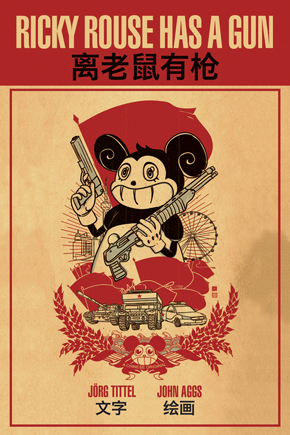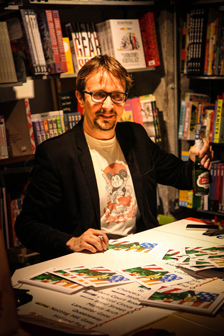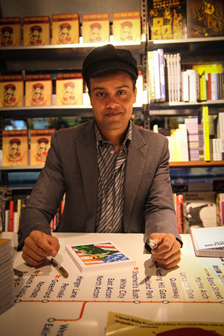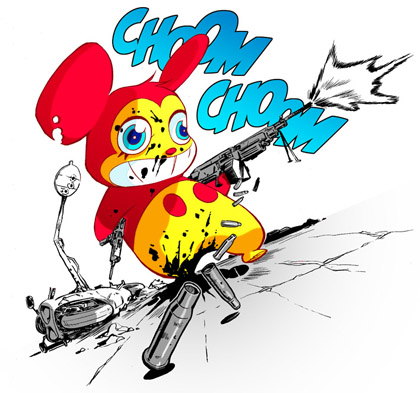Jörg Tittel and John Aggs: Taking the Mickey
by Mark ReynoldsIn May, we ran some pages from Jörg Tittel and John Aggs’ shoot-em-up theme park satire Ricky Rouse Has a Gun, then available only in a limited-run special edition hardback. As the paperback is launched, I catch up with the pair – and a stranger in a giant mouse suit.
What was the initial spark for the story (Jörg) – and the drawings (John) – and how did those ideas mutate as the book took shape?
[Jörg] I first came up with this silly idea when I was living in Los Angeles a few years ago. I was clearly a bit crazy in the head, or perhaps I was just a bit frustrated with the direction Hollywood was headed: sequels, prequels, mega-franchise remakes. I was horrified by the prospect of having to watch stale 20th-century characters about to get microwaved back into existence for decades to come. And since that creative angst coincided with America’s growing paranoia about a Chinese ‘invasion’, Ricky Rouse sat his fat ass down on some part of my brain and refused to get up until I finally write this thing.
[John] The original screenplay had to have some work done to convert it to a comic book format. People don’t usually appreciate how far apart the two can be in places. The design for Ricky also took a while to nail down. We needed him to look like a knockoff, but also be memorable in his own right.
[Jörg] Yes, to give you an idea: the original screenplay was 130 pages long… the comic book script was over 300 dense pages. Although I’m sure that’s nothing compared to an Alan Moore script, not to mention his million-word novel.
At what point did you team up, how did you set about working together, and how long did it take to complete the book?
[Jörg] John had worked on a comic with Philip Pullman and was in talks with another superstar author (a book that they’ll be announcing shortly, I believe!), so it was only natural for him to work with, um, little me. Nah, I clearly caught him in a moment of weakness and I tried my best to drag that out for the better part of a year it took us to complete the book. This involved subtle psychological terror techniques such as amassing blackmailing material and hiding his house keys. He hasn’t left his house since. The John Aggs you see now is a double.
[John] This is all true.
At what stage was the book signed up by SelfMadeHero?
[Jörg] As soon as John drew a couple of sample pages, I knew he was the right man for the job: his style perfectly marries Western and Eastern styles into an original and exciting voice. I first approached Emma Hayley at SelfMadeHero with the full script and John’s first few pages and, for some inexplicable reason, she went for it. Ricky Rouse doesn’t strike me as a natural addition to an otherwise tasteful library including Kafka and Lovecraft.
Jörg, how did your experience in writing video games, and as a writer and director for film and theatre, inform your approach to telling this story?
[Jörg] I’ve always been a very visual person so writing a comic book wasn’t a massive stretch for me. That said, I had to rethink pretty much everything. I originally wrote Ricky Rouse Has a Gun as a screenplay since that’s all I know, but adapting it into a comic book required an immense attention to detail that would usually be reserved for the pre-production/storyboarding stage on a movie. After all, John and I had to put a believable theme park with a cohesive map filled with dozens of characters and hundreds of ‘extras’ onto the page. It’s a testament to John’s talent that every character has a distinct look and that it all holds together visually. And then there’s the notion of ‘page turners’, for instance, which requires imagining the full panel layout as you write the script. One tiny shift, and an entire sequence can shift out of balance and lose all suspense and sense of surprise. So writing for a graphic novel is as much as an exercise in storytelling as it is in narrative and visual design. I loved it.
John, how much freedom did Jörg hand over in bringing his characters to life?
[Jörg] Besides the thing with the house keys, I like to think you were pretty free, right John?
[John] Jörg gave me a great deal of freedom in designing the characters, even the mascots for the theme park. I’m not a big fan of colour comics, generally speaking, but he was pretty adamant that the book have some very saturated colour in places. In hindsight, this was a good call.
Were the Die Hard films a direct influence on the story – and the graphics?
[Jörg] No, not at all. All similarities to Die Hard in this story set in a knockoff theme park are purely coincidental. But seriously, yes, of course Die Hard was a major influence and I’ve been very consciously referencing it in the story and script. Die Hard is after all the ultimate Hollywood action film, a classic that has been ripped off endlessly and continues getting copied (badly) to this day. Take a look at Olympus Has Fallen or White House Down, for instance. Two films that, ironically, are carbon copies of each other. Or the most recent Die Hard sequel, which was too awful for words. You just can’t recreate the magic of that first Die Hard. Unless you were to go to China of course and have a bunch of terrorists in mascot outfits blowing each other up.
To me, Die Hard is a symbol for Hollywood’s golden age. It’s influenced movies as much as it has video games, comic books, you name it. And I’d be surprised if Hollywood could make something this fresh and influential again. We may genuinely have to look East for that. The Raid: Redemption was a pretty cool indicator. Now give me that but with some humour, light and hope, please.
[John] Not particularly. I was more influenced by various action comics I’m a fan of. There’s a thriving genre of action stories that do not involve superpowers, especially since Hollywood’s interest in the medium has grown.
Who were your first comic-book heroes – artists, writers and characters?
[Jörg] I grew up in Belgium, so I was mostly exposed to great ‘continental’ European artists such as Grzegorz Rosinski (Thorgal), Schuitens and Peeters, Jean Giraud/Moebius, etc. But I was mostly into manga and anime, totally obsessed with Katsuhiro Otomo, Hayao Miyazaki and Mamoru Oshii. I also adored Bruce Timm’s Batman: The Animated Series. In my view, Mask of the Phantasm is the best comic-book movie to this day. Marvel Comics didn’t really do it for me. Perhaps I was just trying to be different.
[John] Probably Bill Watterson’s Calvin and Hobbes and Marvel from the early 80s. I also got into manga pretty early, via a magazine called Manga Mania in the 90s. It was awesome.
Which other graphic novels past or present would you particularly recommend?
[Jörg] I know it’s a series rather than a single work, but I love Y: the Last Man. It’s the best TV series I’ve never watched. Another Brian K. Vaughan creation The Private Eye, his digital series with Marcos Martin, is excellent.
[John] I’d recommend Sanctuary by Sho Fumimura and Ryoichi Ikegami, but only if you like deeply creepy political drama. It’ll make you squirm. Also Fish and Chocolate by Kate Brown. It’s a pretty powerful book.
Would you expect to get into trouble with Disney if you started making official Ricky Rouse merchandise?
[Jörg] Only if we tried to sneak some Ricky Rouse shirts into the Disneyland Store. I think Disney has genuine rip-off merchandise to worry about. And it’s probably best that they let this silly parody run its course. Heck, they should finance the movie under their ‘adult’ Touchstone brand. I’d go and see that!
[John] Not entirely sure I share your confidence there, Jörg. Disney can be pretty tenacious. If memory serves they once financially crippled a Tijuana bible artist just for the hell of it. But as the one who owns the rights to this book, it’ll be you getting kneecapped by Bambi and Jar-Jar anyway.
[Jörg] Technically, the copyright is owned by a company called Fengxian Amusements Limited. I deny all involvement.
How would you react if rip-off Ricky Rouse merchandise began to appear?
[Jörg] I’d be flattered.
[John] I’d find that deeply amusing.
How often have you personally bought rip-off brands? (And why wouldn’t you?)
[Jörg] I regrettably saw the Robocop remake in the cinema. And they are surprised piracy has become so popular. Tickets for that sort of stuff should be free, funded purely by the interminable ads that precede it. A bit like your Facebook page. Asking people to pay for such a flaccid, marketing-driven cash-in is criminal.
[John] I don’t really buy branded anything. Although I’ve ripped off my fair share of software over the years. Back in the day the tools I needed to make comics had to be pinched. Piracy is likely the herald of a complete collapse of copyright law. We’re in an age where ‘sharing’ is encouraged but ‘piracy’ is illegal. Things like SOPA do worry me, but they don’t change the fundamental fact that copyright law is incompatible with digital anything. When you view something online, you’re making a copy.
Is the American Century coming to an end?
[Jörg] It did. At the end of last century!
[John] It’s pretty much fallen to multinational corporations already. Both US foreign and domestic policy is designed to serve the interests of a corporate elite, or perhaps even a faceless rhizome of market forces. China is heading in a similar direction. The American Century might continue for a while though thanks to US soft power. Basically, “our companies are still cooler than theirs”.
What is the best and worst that could happen as China is confirmed as the world’s strongest superpower?
[Jörg] The best: more Stephen Chow movies. The worst: our children having to build Xiaomi phones in massive factories for peanuts. We have no idea how lucky we’ve been.
[John] The Best is that China is one of the few countries capable of turning its legislature and systems to combat catastrophic global climate change. The worst is probably how the USA will react to the shift in global hegemony. I wonder which will get us first?
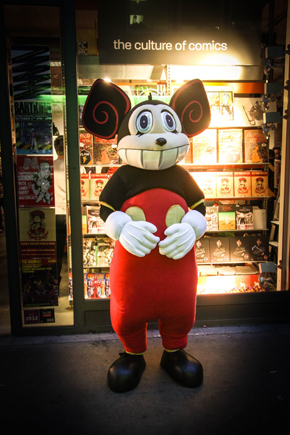
… and here’s Ricky himself at the launch at Gosh! Comics
Who was the biggest rodent in the George W. Bush – and Tony Blair – administrations? And are their successors a vast improvement?
[Jörg] Bush and his cronies (Blair being one of them) were an utter disaster and have tipped the world over the edge, there’s no doubt about it. But bizarrely, with those guys what you saw was what you got. They looked and talked like crooks. The new, far more likeable and human US administration has barely been able to scrape itself out of the barrel, and its schizophrenic mix of action and inaction has allowed the hatred fuelled by Bush’s oil war to culminate in barbarians such as ISIS terrorising the entire planet. It’s terribly tragic. Obama was a lovely idea, but the execution has been a massive let down. I can’t blame him entirely. He is, after all, surrounded by assholes. But can he please give that Nobel Peace Prize to someone more deserving? It would only be the correct thing to do.
[John] I think they’re all just iterations in the natural creation of oligarchies over time. We should probably be thanking the Bush and Blair administrations for making that painfully obvious.
Are the Chinese characters on the cover genuine or fake? If genuine, what is the literal meaning of the characters used in the title and in your names?
[Jörg] They are genuine! They are the translated title and it says ‘Art’ under John’s and ‘Story’ under my name. Some of the characters in the story speak Chinese, too, but I’ll leave it to the readers to translate those.
[John] I did not know that!
What are the prospects for Ricky Rouse being adapted as a movie or video game?
[Jörg] I’ll leave my phone on until that life-changing phone call. Mr Bruckheimer, you know you want to!
[John] I’m already terrified by that giant mouse costume Jörg had made. I can’t imagine 90 minutes of one of my drawings walking about on screen! I’d probably enjoy a small developer taking the concept for a mobile game though. That’d be fun.
What are you working on next?
[Jörg] Together with my wife and partner-in-crime Alex, we’ve been working on a feature-length adaptation of György Dragomán’s multiple award-winning novel The White King. We’re working on it with producer Bob Salerno (We Need to Talk About Kevin, A Single Man, 21 Grams) and the first stars have come on board for a 2015 shoot. I cannot wait to share the result with the world. On a far smaller scale (at least for now), I’ve been writing a Young Adult sci-fi series which will surface as a comic book next year. Both projects are very different from Ricky Rouse Has a Gun, but I intend to return to crazy satire again in the future.
[John] I’m at work on another graphic novel for Random House that I can in no way talk about just yet. I’m also working on my cyberpunk magnum opus that should be ready sometime late 2015. Comics take ages!
Jörg Tittel writes, produces and directs plays, films and videogames. Notable successes are the critically acclaimed 2+2+2 at the King’s Head Theatre, the short film Battle for Britain starring Julian Glover, and West End success Fiesta (The Sun Also Rises), an explosive adaptation of Hemingway. Jörg is a BAFTA member and frequent speaker on cross-platform storytelling. Together with partners Alex Helfrecht and Philip Munger, Jörg runs London- and New York-based production company Oiffy. Follow him on Twitter: @newjorg
John Aggs is a comic book artist for adults and children. He has worked with writers such as Phillip Pullman and Robert Muchamore and has been published by the Guardian, Random House, Hachette and many others. Follow him on Twitter: @johnaggs
Ricky Rouse Has a Gun is published by SelfMadeHero.
Mark Reynolds is a freelance editor and writer, and a founding editor of Bookanista.
Photography © Mauricio Molizane
An early iteration of the mouse: “Imagine an actual human being inside this thing. He would be awesome in a video game, though.”
Jörg talks among the grown-ups at NYU Law School about rip-off culture:
Copyright vs. Creativity: Is Intellectual Property Reserved for the 1%? from Oiffy on Vimeo.

